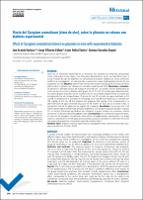| dc.contributor.author | Aranda-Ventura, José | |
| dc.contributor.author | Villacrés-Vallejo, Jorge | |
| dc.contributor.author | Núñez-Tuesta, Lener | |
| dc.contributor.author | González-Aspajo, German | |
| dc.date.accessioned | 2023-06-19T21:47:56Z | |
| dc.date.available | 2023-06-19T21:47:56Z | |
| dc.date.issued | 2020-12-06 | |
| dc.identifier.citation | Revista Peruana de Medicina Integrativa. 2020; 5(4). | es_PE |
| dc.identifier.uri | https://hdl.handle.net/20.500.12959/3946 | |
| dc.description.abstract | Cada vez se encuentra disponible en el mercado una variedad de alimentos etiquetados como “alimentos funcionales”,con diferentes declaraciones sobre sus beneficios para la salud, incluyendo para la diabetes; los compuestos bioactivos hallados en varios alimentos justifica la investigación, en este estudio se evaluará la capacidad hipoglicemiante de una especia de cocina. Objetivo.Determinar si el extracto acuoso del Syzygium aromaticum tiene efecto sobre la glicemia en ratones con diabetes experimental (DE). Materiales y métodos. Se elaboró el extracto acuoso de Syzygium aromaticum. Los ratones fueron distribuidos en cinco grupos de cuatro unidades cada grupo(G). El G1 sin DE recibieron agua destilada (AD), los cuatro grupos restantes fueron ratones con DE. La diabetes experimental se indujo con estreptozotocina vía intraperitoneal, logrando valores hiperglicémicos. El grupo G2 con DE
tratados con agua destilada, G3 con DE tratados con Syzygium 50 mg/kg, G4 con DE tratados con Syzygium 200 mg/kg, G5 con DE tratados con acarbosa 100 mg/kg, estos tratamientos y la administración de agua destilada al grupo sin DE fueron en dosis única durante 5 días; la evaluación final de las glicemias se realizó a las 24 horas después. Resultados: Los grupos G3 y G4, disminuyeron significativamente(p<0,05) la glicemia con respecto al grupo placebo. El grupo G3 no mostró diferencia significativa con respecto al grupo tratado con acarbosa, ambos mostraron un drástico efecto hipoglicemiante. Conclusiones. En condiciones experimentales, el extracto de Syzygium aromaticum tiene efecto hipoglicemiante equiparable a la droga control, y podría ser el primer paso para que esta especia se considere un alimento funcional con potencial preventivo y terapéutico para la diabetes tipo 2. | es_PE |
| dc.description.abstract | A variety of foods labeled "functional foods" are increasingly available on the market, with
different claims about their health benefits, including for diabetes; the bioactive compounds
found in various foods justifies the investigation, in this study the hypoglycemic capacity
of a kitchen spice will be evaluated. Objective: To determine if the aqueous extract of
Syzygium aromaticum has an effect on glycemia in mice with experimental diabetes (ED).
Materials and methods: The aqueous extract of Syzygium aromaticum was prepared.
The mice were divided into five groups of four units each group (G). Group G1 without
DE received distilled water (DA), the remaining four groups where mice with ED. ED was
induced with streptozotocin intraperitoneally, achieving hyperglycemic values. Group G2
with ED treated with distilled water, G3 with ED treated with Syzygium 50 mg / kg, G4 with
ED treated with Syzygium 200 mg / kg, G5 with ED treated with acarbose 100 mg / kg, these
treatments and the administration of distilled water to the group without ED were in a
single dose for 5 days; the final evaluation of the glycemia was carried out 24 hours later.
Results: The G3 and G4 groups significantly decreased (p <0.05) the glycemia with respect
to the placebo group. The G3 group did not show a significant difference with respect to
the group treated with acarbose, both showed a drastic hypoglycemic effect. Conclusions:
Under experimental conditions, the Syzygium aromaticum extract has a hypoglycemic
effect comparable to the control drug, and could be the first step for this spice to be
considered a functional food with preventive and therapeutic potential for type 2 diabetes. | es_PE |
| dc.format | application/pdf | es_PE |
| dc.language.iso | spa | es_PE |
| dc.publisher | Seguro Social de Salud (EsSalud) | es_PE |
| dc.relation.uri | https://rpmi.pe/index.php/rpmi/article/view/248 | es_PE |
| dc.rights | info:eu-repo/semantics/openAccess | es_PE |
| dc.rights.uri | https://creativecommons.org/licenses/by-nc-sa/4.0/ | es_PE |
| dc.subject | Diabetes mellitus experimental | es_PE |
| dc.subject | Hipoglucemiantes | es_PE |
| dc.subject | Alimento funcional | es_PE |
| dc.subject | Syzygium | es_PE |
| dc.subject | Hypoglycemic | es_PE |
| dc.subject | Functional food | es_PE |
| dc.subject | Syzygium aromaticum | es_PE |
| dc.title | Efecto del Syzygium aromaticum (clavo de olor), sobre la glicemia en ratones con diabetes experimental | es_PE |
| dc.title.alternative | Effect of Syzygium aromaticum (clove) on glycemia in mice with experimental diabetes | es_PE |
| dc.type | info:eu-repo/semantics/article | es_PE |
| dc.subject.ocde | https://purl.org/pe-repo/ocde/ford#3.02.29 | es_PE |
| dc.identifier.doi | https://doi.org/10.26722/rpmi.2020.v5n4.248 | |






